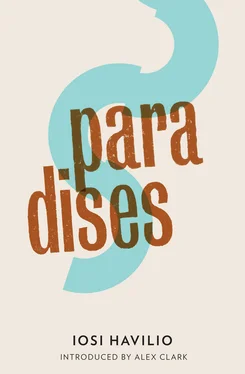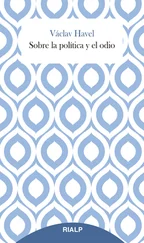Iosi Havilio - Paradises
Здесь есть возможность читать онлайн «Iosi Havilio - Paradises» весь текст электронной книги совершенно бесплатно (целиком полную версию без сокращений). В некоторых случаях можно слушать аудио, скачать через торрент в формате fb2 и присутствует краткое содержание. Год выпуска: 2013, Издательство: And Other Stories, Жанр: Современная проза, на английском языке. Описание произведения, (предисловие) а так же отзывы посетителей доступны на портале библиотеки ЛибКат.
- Название:Paradises
- Автор:
- Издательство:And Other Stories
- Жанр:
- Год:2013
- ISBN:нет данных
- Рейтинг книги:3 / 5. Голосов: 1
-
Избранное:Добавить в избранное
- Отзывы:
-
Ваша оценка:
- 60
- 1
- 2
- 3
- 4
- 5
Paradises: краткое содержание, описание и аннотация
Предлагаем к чтению аннотацию, описание, краткое содержание или предисловие (зависит от того, что написал сам автор книги «Paradises»). Если вы не нашли необходимую информацию о книге — напишите в комментариях, мы постараемся отыскать её.
is an almost perfect novel." — Albert Camus's
reimagined with a female lead in in twenty-first-century Buenos Aires.
Recently widowed, a young woman leaves the countryside for Buenos Aires with her four-year-old son where she seeks to build a new life for herself. She finds work in the zoo and moves into the human zoo of a squatted tower block at the invitation of one of its residents, to whom she acts as nurse, giving morphine injections.
Paradises — читать онлайн бесплатно полную книгу (весь текст) целиком
Ниже представлен текст книги, разбитый по страницам. Система сохранения места последней прочитанной страницы, позволяет с удобством читать онлайн бесплатно книгу «Paradises», без необходимости каждый раз заново искать на чём Вы остановились. Поставьте закладку, и сможете в любой момент перейти на страницу, на которой закончили чтение.
Интервал:
Закладка:
She embraces me and grabs a hand which she pulls to her pocket for me to feel it. I brought you a surprise, she says as we walk in front of the creature, I still can’t work out what it’s meant to be, and Eloísa sticks her tongue out at it as we pass, just for the sake of it, she can’t help herself. I’m a bit embarrassed. Whoever’s sweating inside the costume must be cursing her and overheating even more. We cross the road diagonally, heading for the plaza in front of a building made of mirrored glass with a large American flag flying high.
We sit at the top of a slope, at the foot of the pergola. Very tall banana trees, a weeping willow and a string of paradise trees border the avenue. Canetti’s right, I’m beginning to hate them. Ta dah, says Eloísa and brings out a joint, thick as a fat finger. Flowers from the best garden. It takes a while to light it because a wind gets up, not strong but whirling, which plays with the flame of the lighter. A moment of calm and then another gust. In the sky there are white and translucent surface clouds, speeding northwards; others, higher up, are towers of grey foam that move slowly from the river towards us. Rain or refreshment, you get the feeling that something’s going to happen. It’s been like this all day, heavy and indefinite.
We smoke in silence, two draws each, it feels like it’s never going to end. The rain doesn’t come, instead we feel an unexpected relief on our skin. Eloísa speaks again, she can’t bear the void. Did you have a good time the other night? she asks but she doesn’t allow me to answer, she continues alone: Did you see what ugly bastards Axel’s friends are, every single one. And work, how’s it going? It’s fine, I say, I don’t mind it. She pauses to take a drag and I’m about to tell her about the iguana but I change my mind. I tell her about Simón, about the poison beads, the night in the hospital, What a bummer, she says but deep down she doesn’t hear me at all, out of jealousy, because her mind’s on something else or she’s scared of children.
I wonder what it would be like if she kissed me now or if later on she felt like stroking a breast and started sucking it. I’d certainly let her do it. When she’s in front of me, she reveals everything, unbridled, like at the party, telling me about her orgies and fantasies, it’s as though I’m seeing her through glass, on a screen. Something similar must happen to how she sees me. She doesn’t come on to me nor does she provoke me, and I don’t look for it either. It’s true that I haven’t really been turned on for a while now, not even by Iris, who became more of a curiosity than anything else. I masturbate once in a while, so as not to lose the habit, in the same way I scratch my neck or cross and uncross my fingers when I don’t know where to put my hands.
The high clouds pass by, the ones that looked like they were bringing rain, and the sky clears, tinged orange where the sun is setting. Far from the city. Sliding down the grass, we reach the flat ground and lie down on our backs, the joint goes out thanks to the humidity floating in the air. We stay like that for a while until one of us, her, me, I’m not sure, points out a group of women doing gymnastics. They form a circle around a boy in sports gear and dark glasses with a lifeguard’s body who’s giving them instructions about the exercises, providing an example of every movement. They imitate him as best they can, some skilfully, others struggling. Leapfrogs, flexes, abdominals and a quick jog to the pergola and back. From where we are lying, we see them come and go, heads where the feet should be, feet in place of heads. A silent film, hilarious. Sequences that are more than just clumsy, they’re spastic, trainers, legs, arms, armpits and hips coordinating like endless marionette parts. But the thing that kills us is the arses. Sad, baggy, arses like faces, tight, chubby, with drooping jaws, chatty or circumspect, arses in action. Our laughter ends up choking us.
I could eat a couple of horses, says Eloísa, recovering her breath. We hoist ourselves up hand in hand. We skirt the group of gymnasts and Eloísa can’t help mocking, releasing a forced, unnatural cackle, which I accompany with a discreet smile and increase my pace. To cross the road, Eloísa grabs my arm tightly as if she were wobbling and about to fall. A game, another game. Climbing onto the pavement again, feeling me cold and unenthusiastic, she gives a wink of disappointment.
The plaza is a mess, the traffic lights don’t work, which everyone is using as an excuse for exasperation. Further over, Garibaldi rides on high. Undertaking a certain amount of risk, we dodge cars, motorbikes and buses and enter a luminous pizzeria without consulting each other. I go first, Eloísa follows behind, and as soon as she sets foot in the place she spits out another cackle. I turn round, she covers her mouth with a hand, with the other she points to my back. My T-shirt is sprouting grass, my hair too, as are hers. Before we sit down, as we shake our clothes in spite of the censorious looks, Eloísa, her voice choked, says: It looks like we’ve been rolling about like lezzers.
I go to the toilet, I pee a lot and carry on removing grass from my hair in front of the mirror. There’s always a bit more. My face is red, my cheeks hot, as if I’d been running. I return to the table, Eloísa is flicking through the menu. I’ve got cash, she says, order what you want, Axel gave it to me to buy him some medicine I couldn’t get, I’ll tell him I spent it on the taxi and that’s that. We are served by a very well-spruced waiter, as Eloísa would say: fake tan, fully waxed arms and highlighted hair. A boy who punctuates every phrase he utters with a movement of the shoulder, the left, the right, it depends, on the defensive, as if saying: What do I care. A local faggot, that’s how Eloísa defines him as we watch him move away with our order: a pitcher of beer, here they call it a double jug, and a mozzarella pizza with anchovies. A real one, explains Eloísa so that there’s no doubt and I understand the allusion to Axel, who is the fake faggot.
Let’s go for a couple of quick puffs before the pizza comes, says Eloísa, nodding towards the bathroom. She wears me out. Imagine if one of them comes in. I’m referring to the old lady in a pearl necklace, chewing with loose dentures, the young woman with inflated tits and a television face or the girl at the next table who’s giving us a dirty look, God knows why. Imagine, I insist, and now the two of us, as we did a while ago, lying on the slope watching the upside-down aerobics class, explode into laughter, which makes us the centre of attention once more, Eloísa beating her palm on the table, which sounds just like a drum roll, me, drinking beer to try to hide it. In fact, one of the waiters, not ours, who is reprimanding us with signals from his raised shoulder, allows himself to be infected and gives a hint of a smile which he aborts as soon as the man at the till points out an unattended table.
We gradually calm down, eyes red, tired from so much laughing, just in time for the arrival of our order. For a while, as we eat and drink beer without pause — the anchovies are more than salty, they’re poisonous — we don’t say much. We just smile every time the camp waiter approaches us, somewhere between solicitous and mocking, and gives us one of his contemptuous gestures as he asks if we’d like anything else. We munch away rather animalistically, not worrying about manners, mouths dirty, hands greasy, dripping tomato sauce. We paint the tablecloth with stains of all shapes.
Finally sated, we take a deep breath and Eloísa starts talking again. She says that Axel now wants to make her an actress in the film. What film, I ask. The film they’re going to make with Andy, the one with the Martians. I told you. Oh, yes. I’m fed up of him, I’d move tomorrow but I don’t have the money. I want to get the hell out of there, that’s what she says. Yes, the house is really good, but having him wandering round all day is unbearable. He’s a worm, she says, and the word resonates in me somewhere. She is interrupted by a black man, really black, from Africa or Central America, passing among the tables with a briefcase full of jewellery. Bracelets, earrings, gold chokers, as well as watches, fake and luxurious, blue backgrounds, silver-plated, with moons and suns. Eloísa tries everything. The black guy, who doesn’t utter a single word, partly out of timidity, but mainly because he has earphones in and appears to have no intention of entering into contact with the outside world, is patient. Nor does he protest when Eloísa ends up saying, Thanks, maybe next time. He half closes the briefcase with two fingers and moves on. We take swigs of beer in unison and once more fall into silence. And what if we go and live together? says Eloísa suddenly with a foam moustache on her lip. I raise my eyebrows without stopping drinking but I don’t say anything, nor am I going to. She doesn’t insist either, she must have remembered Simón and rejected the idea quickly. She stands up: Be right back, I’m going to pee. I space out, head resting on my hand, my palate still burning from the anchovies, I look out of the window: a man missing a leg is crossing the street dressed in combat gear. People look at him with a mixture of repulsion and commiseration. He steps onto the pavement, I lose sight of him, I let my eyes zigzag along the pedestrian route disfigured by the heat, the tyres and the million soles treading it. An X-ray of a pair of sick lungs comes into my mind. I think about Tosca and melanomas. The gay waiter rescues me by very deliberately clinking the cutlery to wake me up.
Читать дальшеИнтервал:
Закладка:
Похожие книги на «Paradises»
Представляем Вашему вниманию похожие книги на «Paradises» списком для выбора. Мы отобрали схожую по названию и смыслу литературу в надежде предоставить читателям больше вариантов отыскать новые, интересные, ещё непрочитанные произведения.
Обсуждение, отзывы о книге «Paradises» и просто собственные мнения читателей. Оставьте ваши комментарии, напишите, что Вы думаете о произведении, его смысле или главных героях. Укажите что конкретно понравилось, а что нет, и почему Вы так считаете.











